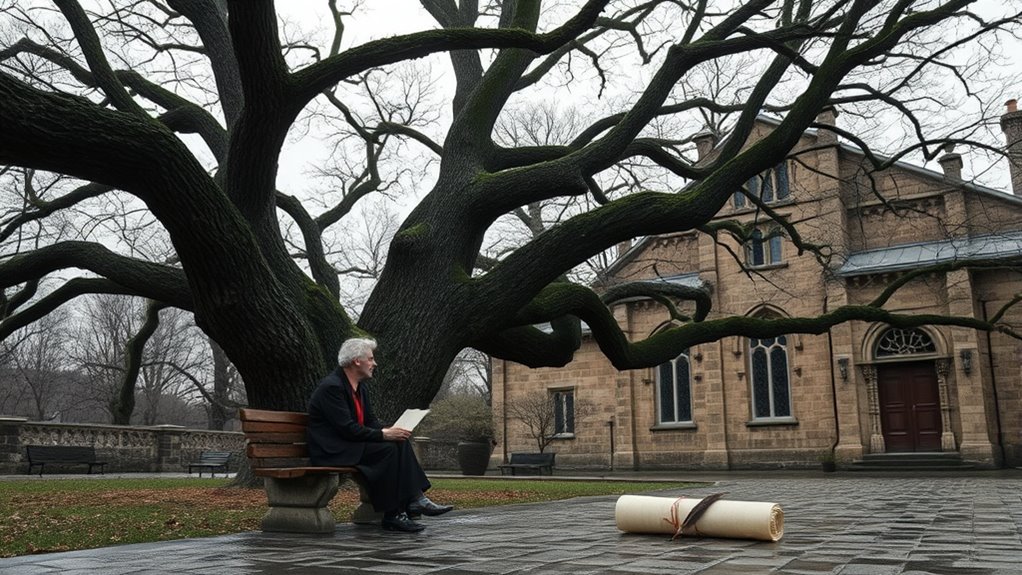Beyond “I know nothing,” Socratic skepticism teaches you to embrace your knowledge limits, fostering humility and curiosity. Instead of seeking absolute certainty, you’re encouraged to question assumptions and remain open to new perspectives. This ongoing inquiry helps prevent overconfidence and promotes ethical humility when engaging with others. Recognizing your own limitations can lead to deeper understanding and growth. If you continue exploring, you’ll discover how this philosophical approach guides you toward wiser, more respectful interactions.
Key Takeaways
- Socratic skepticism emphasizes questioning assumptions to deepen understanding, rather than accepting certainty at face value.
- It teaches that recognizing our knowledge limits fosters humility and opens us to new perspectives.
- The approach promotes ethical humility, encouraging respectful dialogue and consideration of diverse viewpoints.
- Embracing discomfort from uncertainty leads to continuous learning and prevents intellectual arrogance.
- Socratic skepticism views wisdom as an ongoing journey, rooted in inquiry, humility, and openness to growth.

Have you ever questioned the certainty of what you know? It’s a natural impulse, yet it can be uncomfortable to admit how little you truly understand. Socratic skepticism encourages you to embrace this discomfort, not as a sign of weakness but as a path toward deeper insight. When you recognize your knowledge limitations, you develop a sense of ethical humility—an awareness that no matter how much you think you know, there’s always more to learn. This humility isn’t about doubting everything endlessly; it’s about acknowledging your boundaries and approaching knowledge with respect for its complexity. By accepting that your understanding is inherently limited, you become more open to new perspectives and less prone to arrogance or dogmatism.
Socratic skepticism teaches you that certainty is often an illusion. It challenges you to question even your most firmly held beliefs, not to undermine them but to test their robustness. When you do this, you cultivate a mindset that values inquiry over certainty. You learn to ask questions that probe the foundations of your assumptions, recognizing that many of your beliefs rest on shaky ground. This constant questioning isn’t a sign of indecisiveness; it’s a disciplined approach to wisdom. It reminds you that true knowledge isn’t about having all the answers but about understanding the limits of what you can know. This recognition fosters humility and keeps you grounded, preventing you from overestimating your intellectual capacity or dismissing alternative viewpoints.
Moreover, acknowledging your knowledge limitations nurtures ethical humility. It makes you more considerate of others’ beliefs and more cautious about claiming absolute truths. When you accept that your perspective is partial, you’re less likely to dismiss others’ opinions outright. Instead, you approach disagreements with curiosity and respect, understanding that everyone’s view is shaped by their own experiences and limitations. This attitude fosters genuine dialogue and growth, as you’re more willing to listen and learn rather than dominate or dismiss. Socratic skepticism, *thus*, isn’t about doubting everything to the point of paralysis; it’s about balancing curiosity with humility, knowing that the pursuit of wisdom is a lifelong journey—one marked by recognizing your own knowledge limitations and embracing ethical humility along the way.
Frequently Asked Questions
How Does Socratic Skepticism Influence Modern Scientific Inquiry?
Socratic skepticism influences your scientific inquiry by encouraging you to question assumptions and seek empirical validation. You understand that claims need rigorous hypothesis testing before acceptance. This mindset pushes you to remain open-minded, continuously challenge ideas, and refine theories based on evidence. By embracing skepticism, you guarantee your research is thorough, objective, and grounded in evidence, ultimately advancing scientific knowledge through careful validation and critical examination.
Can Socratic Skepticism Be Applied to Everyday Decision-Making?
Imagine your mind as a lighthouse, constantly scanning for hidden rocks. Applying Socratic skepticism to everyday decisions means embracing personal doubt and asking questions about your beliefs and choices. You become a navigator, not just accepting surface answers but probing deeper. This daily questioning helps you make wiser decisions, avoid pitfalls, and stay grounded amid life’s fog. It’s about turning curiosity into a compass for smarter, more reflective living.
What Are Common Misconceptions About Socratic Skepticism?
Many people think socratic skepticism means constantly doubting certainty or rejecting all authority. But it’s actually about questioning assumptions and seeking clarity, not dismissing everything outright. You’re encouraged to doubt certainty thoughtfully, examine beliefs critically, and challenge authority when needed. This approach helps you develop a more nuanced understanding rather than just tearing down ideas, fostering open-mindedness instead of cynicism.
How Does Socratic Skepticism Differ From Other Philosophical Skepticism?
You might think all skepticism questions knowledge equally, but Socratic skepticism is different. It emphasizes empirical doubts, where you challenge the evidence behind claims, and moral uncertainty, which makes you question ethical beliefs. Unlike other skeptics who deny everything, Socratic skeptics focus on dialogue and inquiry to deepen understanding, not to dismiss knowledge entirely. This approach encourages continuous questioning rather than outright disbelief.
Is Socratic Skepticism Compatible With Religious Beliefs?
Imagine your faith getting a giant cosmic hug or a colossal shake-up—that’s what Socratic skepticism can do! It challenges your beliefs, asking if they’re truly justified without dismissing them outright. While some see it as incompatible with faith, others find it a belief challenge that deepens understanding. You can stay faithful while questioning, because Socratic skepticism invites curiosity, not rejection, making faith and doubt surprisingly compatible.
Conclusion
So, next time you feel overwhelmed by the vastness of what you don’t know, remember Socratic skepticism isn’t about despair but curiosity. It’s like carrying a vintage flip phone in a world of smartphones—you stay humble and open to learning. Embrace your ignorance as the original Wi-Fi of wisdom, connecting you to deeper questions. Keep questioning, keep exploring, and let Socrates’ ancient wisdom remind you that true knowledge begins with knowing you don’t have all the answers.









